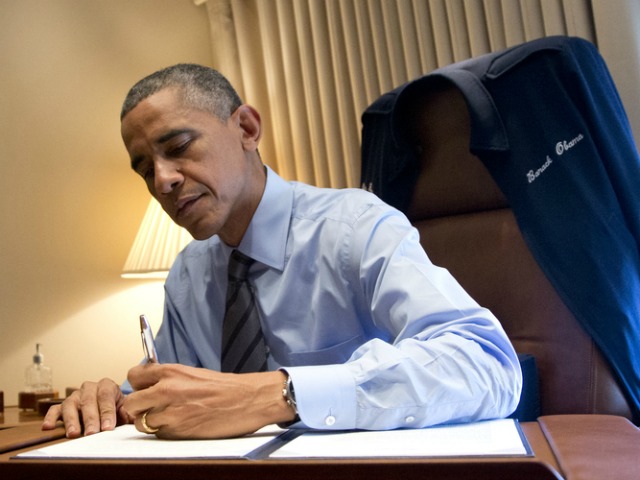This week, President Obama effectively exempted more than four million illegal immigrants from the nation’s immigration laws, granting them the right to apply for work permits and a three-year reprieve from deportation. He cannot, however, hide behind precedent for his decision to act unilaterally.
As justification for the President’s controversial executive order, his administration cites the Constitution’s Take Care Clause. The problem for Obama is that this constitutional provision, instructing the President to “take care that the Laws be faithfully executed,” gives him discretion about how to enforce the law, not discretion about whether to enforce the law.
President Obama admitted as much earlier this year in an interview with Univision, explaining that “the reason that these deportations are taking place is, Congress said, ‘You have to enforce these laws.’ … And I cannot ignore those laws any more than I could ignore, you know, any of the other laws that are on the books.”
Claims that Obama’s unilateral action on immigration merely enforces current immigration law do not pass the laugh test, given his repeated vow to issue an order that would be an improvement over what he sees as a dysfunctional immigration system. Replacing the current law with something more functional is a far cry from enforcing or trying to enforce the current law.
The White House says the President is simply engaging in the long-established practice of prosecutorial discretion–that is, he’s prioritizing resources insufficient to target all of the more than 11 million immigrants illegally in the country. But prosecutorial discretion is a power exercised in service of a law’s enforcement, not a euphemism for doing an end-run around a law you believe is dysfunctional or ill-conceived.
Whatever justification Obama had under the principle of prosecutorial discretion–and it wasn’t much in light of the millions covered by the order and the President’s intent to thwart, rather than carry out, Congress’ intent–evaporated when it became clear that the administration plans to issue work permits to those covered. Prosecutorial discretion is, by definition, a decision to refrain from prosecution; it does not include taking affirmative steps, such as the issuance of work permits, to put the government’s imprimatur on unlawful behavior.
For example, while a president can direct federal prosecutors to focus their efforts on people possessing more than a certain quantity of an illegal narcotic, he cannot unilaterally declare that possession of smaller amounts is legal, no less issue permits to that effect.
In his speech Thursday night, Obama alluded to supposedly similar executive actions taken by previous presidents. In particular, the White House and other Obama defenders point to actions taken by Presidents Ronald Reagan and George H.W. Bush. Indeed, both issued orders protecting groups–albeit smaller ones–of illegal immigrants from deportation. However, neither was attempting to do what Obama just did–that is, thwart the letter and intent of existing immigration law.
To the contrary, after working with a Democrat-controlled House to enact the Immigration Reform and Control Act of 1986 (Simpson-Mazzoli), Reagan issued an order to implement one of its provisions which explicitly authorized the attorney general to allow illegal immigrants not qualifying for legal status under the Act to avoid deportation if needed “to assure family unity.” A few years later, the Bush administration did the same.
Obama’s appeal to precedents set by past presidents would make sense if the Reagan and Bush orders were borne of frustration with Congress’ failure to pass or revise Simpson-Mazzoli. That those order were issued, instead, to implement Simpson-Mazzoli only serves to emphasize the degree to which Obama’s action this week is both unprecedented and unconstitutional.
Curt Levey is a constitutional law attorney and president of the Committee for Justice. Follow him on Twitter at @Curt_Levey.

COMMENTS
Please let us know if you're having issues with commenting.